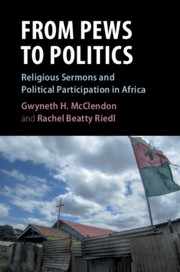Book contents
- Frontmatter
- Contents
- List of Figures
- List of Tables
- Acknowledgements
- 1 Religion as Metaphysical Instruction, and Its Influence on Political Participation
- 2 Christianity and Politics in Africa
- 3 Differences in Contemporary Christian Sermon Content
- 4 Effects of Sermons on Citizens: Evidence from the Lab
- 5 Recharging Sermon Influence: Evidence from Surveys and Focus Groups
- 6 Group-Level Political Engagement
- 7 Implications and Conclusions
- References
- Index
- References
References
Published online by Cambridge University Press: 16 September 2019
- Frontmatter
- Contents
- List of Figures
- List of Tables
- Acknowledgements
- 1 Religion as Metaphysical Instruction, and Its Influence on Political Participation
- 2 Christianity and Politics in Africa
- 3 Differences in Contemporary Christian Sermon Content
- 4 Effects of Sermons on Citizens: Evidence from the Lab
- 5 Recharging Sermon Influence: Evidence from Surveys and Focus Groups
- 6 Group-Level Political Engagement
- 7 Implications and Conclusions
- References
- Index
- References
- Type
- Chapter
- Information
- From Pews to PoliticsReligious Sermons and Political Participation in Africa, pp. 251 - 270Publisher: Cambridge University PressPrint publication year: 2019



